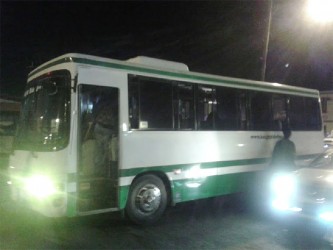Commuters travelling the Georgetown to Mahaica (Route 44) route by minibus will have to pay slight increases in fares after operators managed to make a case for hikes during recent talks with the Ministry of Commerce.
The Vice President of the United Minibus Union Ronald Backer told Stabroek News that passengers would be required to pay an additional $20 or $40 in some instances after “adjustments” to the “government recognised” fare structure issued in 2008 were agreed. However, most schoolchildren will not affected by the increases. In one area, Nooten Zuil/ Hope/Anns Grove there has been a $60 decrease in the children’s fare.
Backer also stated that the Ministry is seeking to work with the Guyana Police Force to avoid breach in fare agreements.
The Ministry has been in talks with operators since last week when the government signaled it would discontinue a free bus service

launched days before so as to not intervene in the livelihood of the bus operators.
The Ministry of Public Works rolled out several big buses to transport persons from certain areas free of cost after it said operators were charging higher fares and threatening strike action.
The Commerce Ministry and the United Minibus Union met on September 18 to discuss the situation affecting the Route 32 operators, who traverse the Georgetown to Parika route.
They then released a joint statement which stated that both parties agreed that the situation must return to normalcy and that the government would withdraw the free buses plying certain routes while operators would reverting to the established structure until official agreement is reached and published as it relates to the fares.
Government’s free buses are still working at Routes 31 (Georgetown to West Bank) and 42 (Georgetown to Timehri).
Speaking to Stabroek News yesterday, President of the United Minibus Union, Eon Andrews stated that the members of the union have promised to keep up their side of the deal but he also pointed out that there are “unscrupulous” individuals who would try to exploit commuters.
He advised the public not to pay more than the negotiated fares.
Andrews also told this newspaper that the union is glad that the ministry could understand that they have a common issue—that is, to ensure that both service providers and commuters gain from the process. “What it would have taught us it that we can only gain anything of worth or understanding if we could sit at one end of the table and sort the problems on the other side of the table. I think, to a point we are heading in that direction,” Andrews said.




